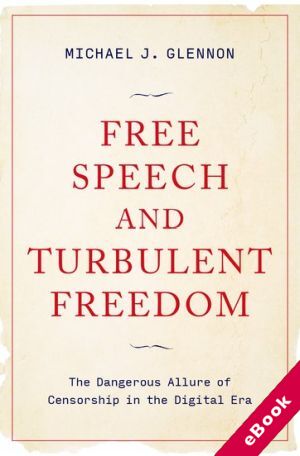
The device(s) you use to access the eBook content must be authorized with an Adobe ID before you download the product otherwise it will fail to register correctly.
For further information see https://www.wildy.com/ebook-formats
Once the order is confirmed an automated e-mail will be sent to you to allow you to download the eBook.
All eBooks are supplied firm sale and cannot be returned. If you believe there is a fault with your eBook then contact us on ebooks@wildy.com and we will help in resolving the issue. This does not affect your statutory rights.
A brisk, practical defense of free speech in America's digital public square that calls on the courts to reject the censors' absolutism, enforce enduring First Amendment principles, and restore a vigorous and robust marketplace of ideas.
A vast censorship regime has smothered America's digital marketplace of ideas, squelching free speech on vital policy issues ranging from public health to electoral politics. Its supporters regard its benefits as morally and politically beyond question. They contend it's carried out by private social media platforms, not governmental authorities. And they insist their partnership is voluntary, not coerced.
In Free Speech and Turbulent Freedom, Michael J. Glennon offers a timely and incisive response. The censors are short-sighted, he argues. Quibbling over outdated distinctions misses the real threat—which is the fusion of public and private power into a modern-day cartel able to overleap longstanding constitutional safeguards. American democracy, he argues, rests on a decentralized marketplace of ideas independent of the government. In crisp, trenchant terms, Glennon shows how concrete practical concerns justify protecting admittedly harmful online speech—even speech that advocates violence or embraces hatred or apparent falsehood. The intellectual journey of Justice Oliver Wendell Holmes Jr. from absolutist to skeptic, he suggests, illuminates the value of political pluralism and the perils of the censors' delusory certitude.
To safely self-correct, democracy requires open channels of political communication. Glennon calls on the courts to unblock those channels—to measure such speech against enduring First Amendment precepts rather than pliable international norms—and to protect the speech interests not merely of the government and Big Tech, but of all participants in the marketplace of ideas. That includes what's often overlooked: Americans' right to hear. Without robust judicial protection, the specious attractions of censorship—and the absolutist certitude that drives it—will destroy America's marketplace of ideas and, with it, any hope of political self-renewal.